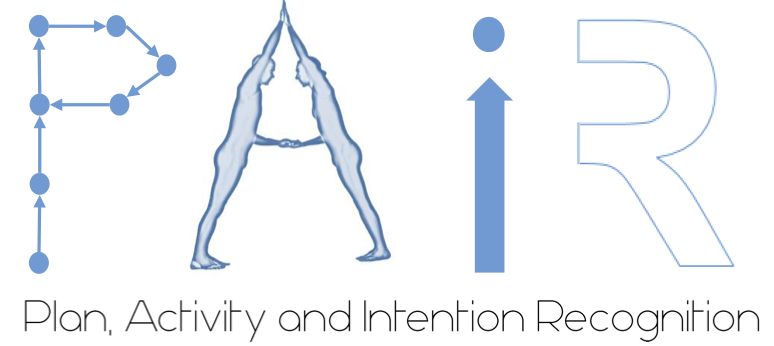PAIR 2018 was one of the most well attended and successful of the PAIR workshop series. Below is the schedule along with links to the papers and talk given (where availble).
9:00am-10:00am Invited talk by Maria Gini (University of Minnesota)
Voice activated intelligent personal assistants: challenges and opportunities The advent of inexpensive voice activated devices (Amazon Echo, Google Home) is opening up new unprecedented opportunities to create personal assistants or a variety of applications and populations. The use of voice is specially promising to enable people with sensory deprivation (e.g., blind users), limited motor control, or mild memory impairments to have a continuously present assistant for many of their daily needs. However, the state of the art of the software for such devices is far from being able to provide intelligent and personalizable assistance. In this talk we will explore open challenges and opportunities.
10:00am-10:30am Paper Session 1
- Robust Goal Recognition in Open-World Games with Generative Adversarial Networks, Wookhee Min, Bradford Mott, Jonathan Rowe, Pengcheng Wang and James Lester.
- Plan Recognition for Network Analysis: Preliminary Report Robert P. Goldman and Scott E. Friedman and Jeffrey M. Rye
10:30am-11:00am Break
11:00am-11:30am Poster Session
- Pillar Networks++: Distributed non-parametric deep and wide networks, Biswa Sengputa and Yu Qian.
- Of Mice and Mazes: Simulating Mice Behavior with Reinforcement Learning, Virin Tamprateep and Peter Stone.
- RAIL: Risk-Averse Imitation Learning, Anirban Santara, Abhishek Naik, Balaraman Ravindran, Dipankar Das, Sasikanth Avancha, Dheevatsa Mudigere and Bharat Kaul.
- A general framework for multi-label learning towards class-correlations and class-imbalance,Yue Peng, Edward Huang, Gang Chen, Wang Chongjun and Junyuan Xie.
11:30am-12:30pm Paper Session 2
- Strong Stubborn Sets for Efficient Goal Recognition Design Sarah Keren and Avigdor Gal and Erez Karpas
- Goal Recognition in Incomplete STRIPS Domain Models Ramon Fraga Pereira and Felipe Meneguzzi
- Towards Quicker Probabilistic Recognition with Multiple Goal Heuristic Search Richard G. Freedman Yi Ren Fung and Roman Ganchin and Shlomo Zilberstein
- Online Goal Recognition as Reasoning over Landmarks Mor Vered and Ramon Fraga Pereira and Maur´ıcio Cec´ılio Magnaguagno and Felipe Meneguzzi and Gal A. Kaminka
12:30pm-2:00pm Lunch
2:00pm-3:00pm Invited talk by Shirin Sohrabi (IBM Research)
Plan Recognition as Planning: Theory and Practice In this talk I will give an overview of our work at IBM Research in applying plan recognition as planning techniques in several applications. I will discuss both the theory and the practical challenges as well as the results and the lessons learned. The talk will focus on the IBM Scenario Planning Advisor (SPA) tool, which is a decision support system that utilizes plan recognition as planning techniques to assist financial organizations in identifying and managing emerging risks.
3:00pm-3:30pm Paper Session 3
- DIPD: Gaze-Based Intention Inference in Dynamic Environments Yu-Sian Jiang, Garrett Warnell and Peter Stone
- A Nearest-Neighbor Approach to Recognizing Subjective Beliefs in Human-Robot Interaction David V. Pynadath and Ning Wang and Ericka Rovira and Michael J. Barnes
3:30pm-4:00pm Break
4:00pm-5:00pm Paper Session 4
- Validation of Hierarchical Plans via Parsing of Attribute Grammars Roman Barták and Adrien Maillard and Rafael C. Cardoso
- Comparing Plan Recognition Algorithms through Standard Libraries Reuth Mirsky and Ran Galun and Ya’akov (Kobi) Gal and Gal Kaminka
- Inverse Reinforcement Learning based Human Behavior Modeling for Goal Recognition in Dynamic Local Network Interdiction Yunxiu Zeng and Kai Xu and Quanjun Yin and Long Qin and Yabing Zha,William Yeoh
- Plan and Goal Recognition as HTN Planning Daniel H¨oller and Pascal Bercher and Gregor Behnke and Susanne Biundo
5:00pm-6:00pm Invited talk by Philip Cohen (Voicebox Technologies)
Steps Towards Collaborative Dialogue Dialogue is all the rage nowadays. Most of the approaches currently receiving attention involve deep learning of stimulus-response pairs, or various machine-learned strategies for simple “slot-filling” dialogues in which a system acquires information sufficient to enable it to perform a single action. In this talk, I will argue that these approaches are too simplistic and will not extend to realistic dialogues. In particular, as currently pursued, they will not support dialogues with intelligent systems that can collaborate with their users to help accomplish the user’s goals.
The talk begins with a discussion of collaboration, which revolves around plan recognition skills learned as a child. Such deeply engrained collaboration strategies will be seen to be at the foundation of dialogue and are expected by human interlocutors. The approach I will advocate to implementing collaborative dialogue systems is to build a (joint) belief-desire- intention architecture that attempts to recognize the user’s plans, and determines obstacles to their success. The system then plans and executes a response intended to overcome those obstacles. In so doing, the system needs to reason about, and may plan to alter, users’ mental states thereby resulting in speech acts. I will demonstrate a system that embodies this type of collaboration, engaging the user in dialogue about travel planning. Importantly, because the system is driven by plans, it is explainable, and thus able to answer “why” questions. The upshot of this approach is a system that assists its users, and knows what it is doing/saying.
FIN
Zip file of all accepted papers.
Cochairs:
Reuth Mirsky, Primary contact (Ben-Gurion University, dekelr@post.bgu.ac.il), Sarah Keren (Technion University, sarahn@technion.ac.il), Christopher Geib (SIFT LLC, cgeib@sift.net)



